Our department offers four degrees – B.S. in Civil Engineering, B.S. in Environmental Engineering, and M.S. and Ph.D. in Civil and Environmental Engineering. The graduate degrees can be concentrated around one or more sub-disciplines of environmental, geotechnical, water resources, structural, materials, and transportation engineering. Our highly accomplished faculty are active participants in their graduate students’ research projects and take pride in guiding them through their degrees as well as preparing them for their long-term career goals. Together we work on critical issues facing our world related to sustainability and energy; infrastructure systems; climate change, hazard mitigation and adaptation; and environmental and public health. Our emphasis is on interdisciplinary education with research collaborations and opportunities across campus including not only other engineering and science departments but also social science, policy, and medicine. Most faculty have collaborations with colleagues at many other national and international academic institutions, national labs, and governmental agencies, and the private sector.
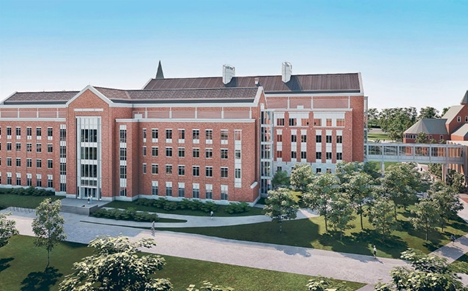
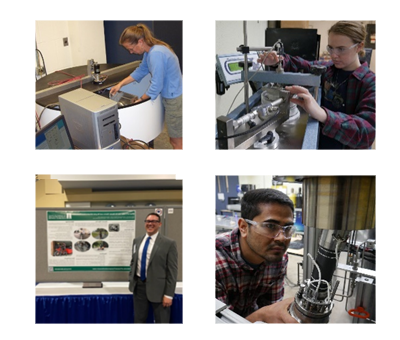

Our graduate students typically use a combination of laboratory/field and analytical/computational research methods. Laboratory work utilizes a variety of state-of-the-art labs in our newly built STEM Complex and many other shared-used facilities on our beautiful campus. Many graduate students also employ the watersheds, landscapes, and strong communities of Vermont as laboratories for their research.
Burlington and surrounding areas offer year-around, exceptional recreational opportunities for our graduate students. They get to enjoy Lake Champlain; hiking, biking and skiing in the mountains; nature walks; and countless more fun activities to take a break from their hard academic work and enjoy what Vermont has to offer.
PhD Graduates
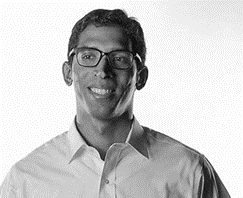 Kalil Erazo, a Hispanic American doctoral student, obtained his PhD from our department in 2015. He specializes in Structural Engineering. His research work is aimed at developing effective, efficient and robust state-of-the-art methods to predict flaws and failure of civil infrastructure systems, and in developing next generation structural damage and seismic protection devices to minimize the impact of extreme natural and human-induced events, reducing the risk associated with catastrophic events. During his time at UVM he was advised by Prof. Eric M. Hernandez. His research was carried out at the Structures and Material Lab. The experimental portion of his research involved vibration testing and instrumentation for monitoring stresses in structures subject to dynamic loading. During his time at UVM he published several papers including a paper titled “A model-based observer for state and stress estimation in structural and mechanical systems: Experimental validation” which has been cited over 50 times in the literature already. He is currently a faculty member in Santo Domingo and adjunct professor at Rice University.
Kalil Erazo, a Hispanic American doctoral student, obtained his PhD from our department in 2015. He specializes in Structural Engineering. His research work is aimed at developing effective, efficient and robust state-of-the-art methods to predict flaws and failure of civil infrastructure systems, and in developing next generation structural damage and seismic protection devices to minimize the impact of extreme natural and human-induced events, reducing the risk associated with catastrophic events. During his time at UVM he was advised by Prof. Eric M. Hernandez. His research was carried out at the Structures and Material Lab. The experimental portion of his research involved vibration testing and instrumentation for monitoring stresses in structures subject to dynamic loading. During his time at UVM he published several papers including a paper titled “A model-based observer for state and stress estimation in structural and mechanical systems: Experimental validation” which has been cited over 50 times in the literature already. He is currently a faculty member in Santo Domingo and adjunct professor at Rice University.
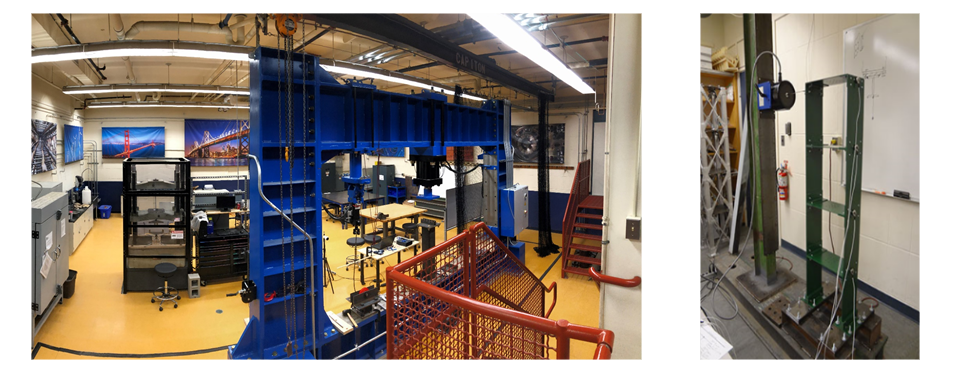
Structures and Materials Lab with our large scale 250k reaction frame (Big Blue), and on the right a small reaction frame for dynamic testing. In this case, a flexible frame is being tested with a shaker and instrumented with various accelerometers.
Kristen Underwood obtained her PhD from our department in 2018. Kristen was a non-traditional female student with more than 29 years of academic and professional experience in water resources, bridging fields of aquatic ecology, fluvial geomorphology, hydrogeology and environmental engineering. Kristen was advised by Profs. Donna Rizzo and Mandar Dewoolkar. Her research involved the application of advanced computational tools to address environmental challenges in water resource management and to support pragmatic solutions within an adaptive management framework. She has used machine-learning algorithms and Bayesian inference to evaluate catchment dynamics and biogeochemical processing in rivers. In addition to her computational expertise, Kristen made extensive use of Vermont’s natural resources during her PhD research and was able to validate some of her mathematical models using measurements from Vermont’s rivers. Among many papers that originated from her graduate work, she co-authored paper published in Nature. Dr. Underwood is now a Research Professor at the University of Vermont.
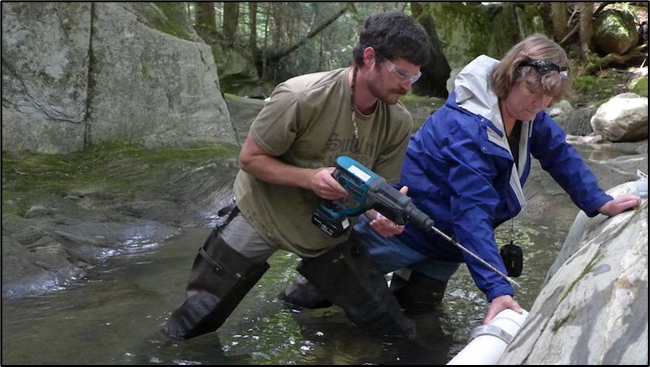
Kristen Underwood installing a river monitoring station at a river in VT. She mentored a number of undergraduate researchers while working on her PhD. Jordan, seen in the photo, inspired by this research experience, pursued a Master’s degree in our department.
Current Doctoral Student
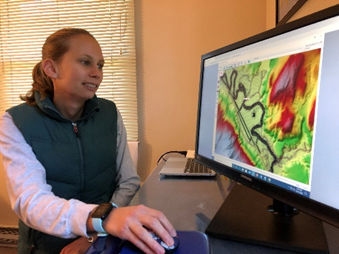 Lindsay Worley, a current doctoral student in our department, joined our program as part of the NSF IGERT Smart Grid Grant. She earned her BS degree in Civil Engineering from UVM in 2013. Upon graduation, she worked as a consulting engineer first in solar and then in stormwater management. She came back to our department for her PhD in 2017. During the summer of 2018, she had an internship at Oak Ridge National Laboratory in Oak Ridge, Tennessee as part of the IGERT grant. She worked in the hydropower department on the team concentrating on the Standard Modular Hydropower Project. She is now working with Professor Kristen Underwood as her primary advisor and Professor Donna Rizzo as her secondary advisor. Lindsay recently completed the Center for Teaching and Learning Graduate Teaching Program, which is included in the superrvised training of the GAANN Fellows.
Lindsay Worley, a current doctoral student in our department, joined our program as part of the NSF IGERT Smart Grid Grant. She earned her BS degree in Civil Engineering from UVM in 2013. Upon graduation, she worked as a consulting engineer first in solar and then in stormwater management. She came back to our department for her PhD in 2017. During the summer of 2018, she had an internship at Oak Ridge National Laboratory in Oak Ridge, Tennessee as part of the IGERT grant. She worked in the hydropower department on the team concentrating on the Standard Modular Hydropower Project. She is now working with Professor Kristen Underwood as her primary advisor and Professor Donna Rizzo as her secondary advisor. Lindsay recently completed the Center for Teaching and Learning Graduate Teaching Program, which is included in the superrvised training of the GAANN Fellows.

